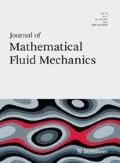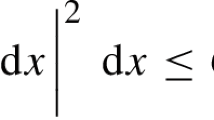Abstract
So far existence of dissipative weak solutions for the compressible Navier–Stokes equations (i.e. weak solutions satisfying the relative energy inequality) is known only in the case of boundary conditions with non zero inflow/outflow (i.e., in particular, when the normal component of the velocity on the boundary of the flow domain is equal to zero). Most of physical applications (as flows in wind tunnels, pipes, reactors of jet engines) requires to consider non-zero inflow–outflow boundary condtions. We prove existence of dissipative weak solutions to the compressible Navier–Stokes equations in barotropic regime (adiabatic coefficient \(\gamma >3/2\), in three dimensions, \(\gamma >1\) in two dimensions) with large velocity prescribed at the boundary and large density prescribed at the inflow boundary of a bounded piecewise regular Lipschitz domain, without any restriction neither on the shape of the inflow/outflow boundaries nor on the shape of the domain. It is well known that the relative energy inequality has many applications, e.g., to investigation of incompressible or inviscid limits, to the dimension reduction of flows, to the error estimates of numerical schemes. In this paper we deal with one of its basic applications, namely weak–strong uniqueness principle.
Similar content being viewed by others
Notes
We say that \(f\in C_\mathrm{weak}([0,T], L^p(\Omega ))\) iff \(f:[0,T]\rightarrow L^p(\Omega )\) is defined everywhere on [0, T], \(f\in L^\infty (0,T; L^p(\Omega ))\) and the map \(t\mapsto {\int _{\Omega }} f\varphi (t,\cdot ) \ \,{\mathrm{d}} {x}\in C[0,T]\) for all \(\varphi \in L^{p'}(\Omega )\).
The requested regularity of some of this derivatives can be slightly weaken by a more detailed (elementary) analysis as in [15].
The exact choice of \(\beta \) is irrelevant from the point of view of the final result provided it is sufficiently large.
For bounded Lipschitz domains such extension always exists, cf. Remark 2.1.
The only difference with respect to [4, Lemma 4.1] in Lemma 3.1 is the fact, that the test function in equation (3.7) does not vanish at the outflow boundary and the energy inequality is more precise containing also all boundary terms. This is essential for the construction of dissipative solutions. We also do not need the belonging of \(\mathbf{u}_\infty \) to the class (2.13).
The passage to the limit in the energy inequality in [4] requires the property \(\mathrm{div}\mathbf{u}_\infty \ge 0\) in a (small) inner neighborhood of \(\partial \Omega \), cf. (2.13), when dealing with the term \(\int _0^\tau {\int _{\Omega }} p_\delta (\varrho )\mathrm{div}\mathbf{u}_\infty \ \,{\mathrm{d}} {x}\). We can get rid of this requirement by using Lemma 6.1 by the same type of reasoning used to handle the similar term in the relative energy inequality, cf. (6.10).
Here and hereafter, the standard compactness arguments include the Sobolev imbeddings, Arzela-Ascoli theorem and Lions-Aubin lemma.
This Lemma holds without condition \(p(0)=0\), \(p'(\varrho )>0\); regularity assumption of (2.2) is enough.
References
Abbatiello, A., Feireisl, E., Novotný, A.: Generalized solutions to models of compressible viscous fluids. Discrete Contin. Dyn. Syst. A 41(1), 1–28 (2021)
Bresch, D., Jabin, P.-E.: Global existence of weak solutions for compresssible Navier–Stokes equations: thermodynamically unstable pressure and anisotropic viscous stress tensor. Ann. Math. 188, 577–684 (2018)
Benzoni-Gavage, S.: Calcul différentiel et équations différentielles. Dunod (2010)
Chang, T., Jin, B.J., Novotny, A.: Compressible Navier–Stokes system with general inflow–outflow boundary data. SIAM J. Math. Anal. 51(2), 1238–1278 (2019)
Chaudhuri, N.: On weak–strong uniqueness for compressible Navier–Stokes system with general pressure laws. NORWA 49, 250–267 (2019)
Choe, H.J., Novotny, A., Yang, M.: Compressible Navier–Stokes system with general inflow—outflow boundary data on piecewise regular domains. ZAMM Z. Angew. Math. Mech 98(8), 1447–1471 (2018)
Dafermos, C.M.: The second law of thermodynamics and stability. Arch. Rational Mech. Anal. 70, 167–179 (1979)
Denk, R., Hieber, M., Prüss, J.: Optimal \(Lp-Lq\)-estimates for parabolic boundary value problems with inhomogeneous data. Math. Z. 257, 193–224 (2007)
DiPerna, R.J., Lions, P.-L.: Ordinary differential equations, transport theory and Sobolev spaces. Invent. Math. 98, 511–547 (1989)
Evans, L.C.: Partial Differential Equations. Graduate Studies in Mathematics, vol. 19. AMS, New York
Feireisl, E.: Dynamics of Viscous Compressible Fluids. Oxford University Press, Oxford (2004)
Feireisl, E.: Compressible Navier–Stokes equations with a non-monotone pressure law. J. Differ. Equ. 184, 97–108 (2002)
Feireisl, E.: On weak-strong uniqueness for the compressible Navier–Stokes system with non-monotone pressure law. Commun. Part. Differ. Equ. 44, 271–278 (2019)
Feireisl, E., Gwiazda, P., Swierczewska-Gwiazda, A., Wiedemann, E.: Dissipative measure-valued solutions to the compressible Navier–Stokes system. Calc. Var. 55, 141 (2016). https://doi.org/10.1007/s00526-016-1089-1
Feireisl, E., Jin, B.J., Novotný, A.: Relative entropies, suitable weak solutions, and weak-strong uniqueness for the compressible Navier–Stokes system. J. Math. Fluid Mech. 14(4), 717–730 (2012)
Feireisl, E., Novotný, A.: Singular Limits in Thermodynamics of Viscous Fluids, 2nd edn. Birkhauser, Basel (2017)
Feireisl, E., Novotný, A., Petzeltová, H.: On the existence of globally defined weak solutions to the Navier–Stokes equations of compressible isentropic fluids. J. Math. Fluid Mech. 3, 358–392 (2001)
Feireisl, E., Novotný, A., Sun, Y.: Suitable weak solutions to the Navier–Stokes equations of compressible viscous fluids. Indiana Univ. Math. J. 60, 611–632 (2011)
Gallouet, T., Herbin, R., Maltese, D., Novotny, A.: Error estimates for a numerical approximation to the compressible barotropic Navier–Stokes equations. IMA J. Numer. Anal. 36(2), 543–592 (2016)
Gallouet, T., Maltese, D., Novotny, A.: Error estimates for the implicit MAC scheme for the compressible Navier–Stokes equations. Numer. Math. 141(2), 495–567 (2019)
Galdi, G.P.: An Introduction to the Mathematical Theory of the Navier–Stokes Equations I, 2nd edn. Springer, New-York (2011)
Girinon, V.: Navier–Stokes equations with nonhomogeneous boundary conditions in a bounded three-dimensional domain. J. Math. Fluid Mech. 13, 309–339 (2011)
Klein, R., Botta, N., Schneider, T., Munz, C.D., Roller, S., Meister, A., Hoffman, L., Sonar, T.: Asymptotic adaptive methods for multi-scle problems in fluid mechanics. J. Eng. Math. 39, 537–559 (2001)
Lions, P.-L.: Mathematical Topics in Fluid Dynamics. Compressible Models, vol. 2. Oxford Science Publication, Oxford (1998)
Novo, S.: Compressible Navier–Stokes model with inflow–outflow boundary conditions. J. Math. Fluid Mech. 7, 485–514 (2005)
Novotný, A., Straškraba, I.: Introduction to the Mathematical Theory of Compressible Flow. Oxford University Press, Oxford (2004)
Valli, A., Zajaczkowski, M.: Navier–Stokes equations for compressible fluids: global existence and qualitative properties of the solutions in the general case. Commun. Math. Phys. 103, 259–296 (1986)
Author information
Authors and Affiliations
Corresponding author
Ethics declarations
Conflicts of interest
On behalf of all authors, the corresponding author states that there is no conflict of interest.
Additional information
Communicated by G. P. Galdi.
Publisher's Note
Springer Nature remains neutral with regard to jurisdictional claims in published maps and institutional affiliations.
Y.-S. Kwon: The work of the first author was partially supported by NRF-2017R1D1A1B03030249 and NRF-2019H1D3A2A01101128. A. Novotny: The work of the second author was supported by Brain Pool program funded by the Ministry of Science and ICT through the National Research Foundation of Korea, NRF-2019H1D3A2A01101128.
Rights and permissions
About this article
Cite this article
Kwon, YS., Novotny, A. Dissipative Solutions to Compressible Navier–Stokes Equations with General Inflow–Outflow Data: Existence, Stability and Weak Strong Uniqueness. J. Math. Fluid Mech. 23, 23 (2021). https://doi.org/10.1007/s00021-020-00553-z
Accepted:
Published:
DOI: https://doi.org/10.1007/s00021-020-00553-z



